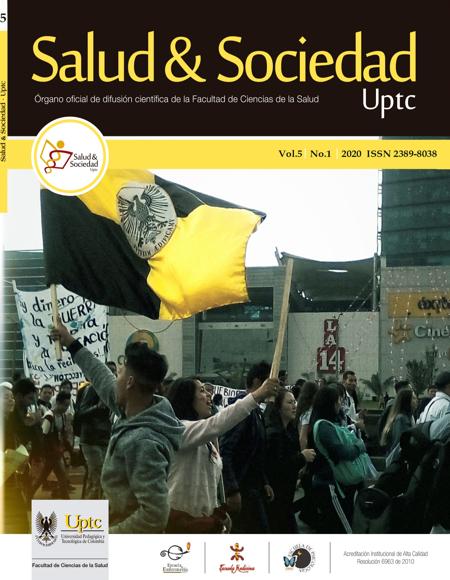Community and social support networks as a resource for health care and health maintenance

Abstract
The Community networks , as an open system of dynamic exchange among the members of a social group (family, neighborhood, association or institution), make it possible to enhance resources for the care and maintenance of a individual's health but those ones can also become in a source of discomfort, stress and illness. Objective: To understand the dynamic of community networks and social support as a resource for the care and maintenance of health (promotion, education and prevention) in some families of the “Los Patriotas” neighborhood in the Tunja city. Methodology: Qualitative research / intervention, based on the participant observation and the reports of 110 research records of 15 UPTC Family Medicine Resident Physicians in their community practice in the Los Patriotas neighborhood in the Tunja city. For this category of analysis, the following items were assumed: The Community and social support networks as family, friends, neighbors, peer groups, social organizations and institutions ( health service, police and educational institutions ... ) Conclusion: The Community and social support groups are relevant due to the support that they provide to society, for the contributions and strong connections for the common interest, such as improving the quality of life and the health of people and communities; This is what prioritizes the importance of community projects in spaces of collective construction and strengthening of any social group.
Keywords
Community networks, Social support, Community, Family and Community Medicine, Qualitative research
References
- Ministerio de salud. Dirección de Promoción y Prevención. Plan de Intervenciones Colectivas. In Minsalud. Orientaciones para la conformación y fortalecimiento de redes sociales y comunitarias en el marco del Plan de Salud Pública de Intervenciones Colectivas. Bogotá.; 2015.
- Cockerham C, Hamby, Oates. The Social Determinants of Chronic Disease. Am J Prev Med. 2017 Jan; 52(1S1).
- Triana Ramírez AN. Proyecto Comunitario: Promoción y mantenimiento de la salud individuo, familia y comunidad del barrio los patriotas del municipio de Tunja: 2019 -2020. Proyecto Comunitario. Tunja: Universidad Pedagógica Y Tecnológica De Colombia, Boyacá; 2019.
- Segura del pozo J. Salud pública y otras dudas. El Barrio como lugar. [Online].; 2018 [cited 2020 Junio 18. Available from: HYPERLINK "https://saludpublicayotrasdudas.
- Aranda B, Pando M. Conceptualización del apoyo social y las redes de apoyo social. Revista IIPSI. UNMSM. 2013 Mayo; 16(1).
- Gállego-Diégueza J, Lineros-González C, Nuin-Gonzálezc B, Sastre-Pazd M. En-red-ando: dialogando sobre salud comunitaria y redes. Informe SESPAS 2018. Gac Sanit. 2018 Octubre; 32(S1): p. 63–65.
- Espinal I, Gimeno A, González F. El Enfoque Sistémico en los Estudios Sobre la Familia. Revista Internacional de Sistemas. 2006 Junio; 1(14).
- Dabas, Perrone. Redes en salud: Fundamentación acerca de nuestra época y las redes sociales. FUNCER. [Online].; 1999 [cited 2020 Junio 20. Available from: https://www.insumisos.com/lecturasinsumisas/Redes%20en%20s alud.pdf
- Louro Bernal I. La Familia en la determinación de la Salud. Rev Cubana Salud Pública. 2003 Enero, 29(1).
- Litwin, Stoeckel J. Tipos de redes de confianza y bienestar entre los europeos mayores. The Gerontologist. 2014 octubre; 54(5): p. 762–772.
- Escuredo Rodríguez , Limón Ramírez. Enfoque Personal y Familiar en la Atención Primaria de Salud. In A. M. Zurro &GJS. Atención Familiar y Salud Comunitaria. Barcelona; 2011. p. 19- 32.
- Corin M. Redes y puertas en Salud Mental Comunitaria en un Centro de Salud y Acción Comunitaria del sur profundo de la CABA. VERTEX. Rev. Arg. e Psiquiat. 2013 enero; XXIV(107): p. 47-54.
- Carreras A. Recursos, Funcionalidad y Disfuncionalidad Familiar. Apuntes: Recursos, funcionalidad y disfuncionalidad familiar. [Online].; 2014 [cited 2020 Julio 2. Available from: https://d1wqtxts1xzle7.cloudfront.net/56240085/Recursosfuncion.-y-disfunc.-fam.-A.-Carreras.- 2014.pdf?1522887960=&response-contentisposition=inline%3B+filename%3DRecursos_Funcionalidad_y_Disfuncionalida.pdf&Expires=1599283728&Signature=IbDhZhi~Ci~IrZ0Q
- Ministerio de salud de chile. Manual de salud familiar con enfoque intercultural y complementario para la red de atención Primaria de salud de Quellón. In chile Mds. Manual de salud familiar. Quellón; 2015.
- Mújica J. Cuatro cuestiones axiológicas de la epidemiología social para el monitoreo de la desigualdad en salud. Rev Panam Salud Publica. 2015; 38(6): p. 433-41.
- Nagarajan, Das. Exploratory, cross-sectional social network study to assess the influence of social networks on the care-seeking behaviour, treatment adherence and outcomes of patients with tuberculosis in Chennai, India: a study protocol. BMJ Open. 2019; 9.
- Foz Gil G, Gofin J, Montaner Gomis i. Atención Primaria Orientada a la Comunidad (APOC)). In Zurro M. Atención Primaria. Barcelona: Barcelona; 2008.
- Koetsenruijter J, van Lieshout, Vassilev, et al. Social support systems as determinants of self-management and quality of life of people with diabetes across Europe: study protocol for an observational study. Health Qual Life Outcomes. 2014 Mar; 12(29).
- Gilbert KL, Crouse Quinn, Ford F, Thomas B. The Urban Context: A Place to Eliminate Health Disparities and Build Organizational Capacity. J. Taylor & Francis Group, LLC. Prev Interv Community. 2011 January; 39(1).
- Kemper-Koebrugge, Koetsenruijter, Rogers, Laurant, Wensing. Local networks of community and healthcare organisations: a mixed methods study. BMC Res Notes. 2016 July; 9(331).